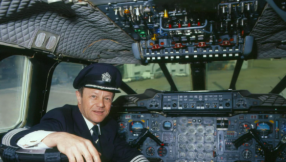New Secretary General joins Anglican Communion
An official commissioning service was given yesterday, Tuesday 18 January 2005 for the Anglican Communion to welcome Kenneth Kearon, the new Secretary General. The position is a vital one and is paramount to much of the work that the 77-million member Anglican communion covers – encapsulating works with the Archbishop of Canterbury, the Primates Meeting, the Lambeth Conference and he Anglican Consultative Council.
Presiding the service was Rev Rowan Williams, the current Archbishop of Canterbury, and he also swore in the new Secretary General.
Williams said in his homily, "So Christ takes hold of us and we of him. He becomes part of our life, our identity. He has made it by his grace and freedom, so that we become part of him, his body. As we seek to live out the apostolic calling, we have to see ourselves as bound, bound up, in him, and bound up in each other. To minister to a Communion – not just to one church, one congregation, one locality – to minister to a Communion worldwide, is surely to minister into this reality. We are bound together, because we are bound in Christ; bound in the one hope of our calling. Prisoners of hope, together. There is nothing we need more than to be reminded of how we are bound with Christ and with one another in that way."
The new Secretary General will move to Lambeth Palace, to reside with the Archbishop of Canterbury.
Others who attended the one-hour service were: Mother Lillian CSA, the Rt Revd John Paterson, chairman of the Anglican Consultative Council, who hosted the day, the Most Revd Clive Handford, Primate of Jerusalem and the Middle East, the Archbishop of Dublin, the Most Revd John Neill, the Dean of Canterbury, the Very Revd Robert Willis, and the Dean of St Paul's London, the Very Revd John Moses, the Dean of Christ Church Cathedral Dublin, the Very Revd Desmond Harmon, and Mrs Fung Yi Wong from Hong Kong.
The following is a brief biography of Rev. Canon Kenneth Arthur Kearon, as provided by the Anglican Communion News Service:
The Revd Canon Kenneth Arthur Kearon was born in Dublin in 1953. After education at Mountjoy School he attended Trinity College in Dublin where he studied Mental and Moral Science for a degree in Philosophy. After further study in Cambridge and Dublin, he was ordained deacon in 1981 and priest in 1982. He served a curacy in the parish of All Saints Raheny and St John's Coolock in the diocese of Dublin & Glendalough and then was appointed Dean of Residence at Trinity College.
In 1991 he became Rector of the parish of Tullow (Dublin) before becoming Director of the Irish School of Ecumenics in 1999. He has also, since 1995, been a member of the Chapter of Christ Church Cathedral, Dublin, and has served as its Chancellor since 2002. Kenneth is a member of the General Synod of the Church of Ireland, Co-ordinator of Auxilliary Ministry (NSM) Training in the church, and a member of the Irish Council for Bioethics.
He is author of Medical Ethics: an Introduction (Columba 1995) and has contributed to a number of volumes on Education, Family and Medical Ethics. Kenneth is married to Jennifer, and they have three daughters.













